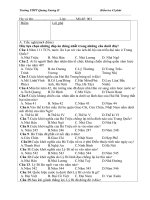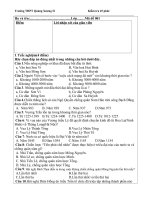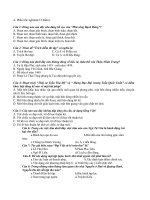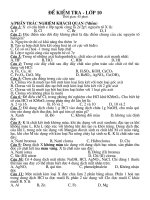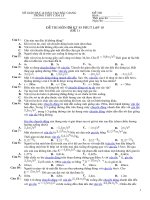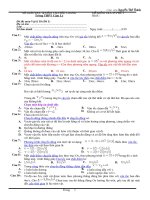Bộ đề kiểm tra 45 phút lớp 10 CB
Bạn đang xem bản rút gọn của tài liệu. Xem và tải ngay bản đầy đủ của tài liệu tại đây (273.25 KB, 25 trang )
UNIT 1
Part I. PHONETICS
Exercise 1. Choose one word whose underlined part is pronounced differently from
the others. Identify your answer by circling the corresponding letter A, B, C, or D.
1. A. interest B. finish C. climate D. panic
2. A. pedal B. satisfied C. land D. plan
3. A. seaside B. realized C. scream D. seat
4. A. children B. chemistry C. kitchen D. chat
5. A. beginning B. passenger C. biology D. technology
Exercise 2. Choose one word whose stress pattern is different. Identify your answer
by circling the corresponding letter A, B, C, or D.
6. A. routine B. physics C. minute D. danger
7. A. breakfast B. purchase C. peasant D. begin
8. A. passenger B. interested C. frightening D. contented
9. A. education B. geography C. occupation D. information
10. A. relative B. cinema C. continue D. suddenly
Part II. READING
PASSAGE 1. For questions 11 - 15, read the passage and decide whether the
statements 11 - 15 are true (T) or false (F). Put a tick () in the appropriate box.
Some years ago I worked as a shift worker for a company 30 miles from our
house. My shift was from 3 to 11 p.m. At that time we lived out in the
countryside, so I had to drive to work on a bumpy road and cross a river on a
very old bridge. One afternoon when I left for work, it was raining heavily. It
often rained very hard during summer in that area, so I didn’t pay any
attention. I finished work that night and started the journey home. Everything
was as usual until I left the highway, got back on the road, and came to the
bridge. It was foggy and dark out there, and it was impossible to see anything.
4
I was crying because the water had risen up to my knees. I knew that there
was a house very near to the river and I needed someone to help. Suddenly, I
could feel something moving from behind. I began screaming in panic since I
realized that it was nothing but a snake creeping into my car.
T F
11. It was raining hard when the writer started going to work.
12. Summer was the dry season in the area where the writer lived.
13. The writer could hardly see anything.
14. The writer saw someone from the house near the river.
15. A snake was moving from behind into the car.
PASSAGE 2. Read the following passage and answer questions 16 - 25.
MY DAILY RO UTINE
My life is always full of activities, so I never have much time for myself.
During the week it's the worst. I usually have to get up at half past six even
though I would really prefer to sleep much later. I don’t usually have time for
breakfast because I have to catch a bus to school at seven o'clock. The bus is
usually packed with many people. Classes at school start at a quarter to eight
except on Tuesdays when they start at seven. Each lesson is forty-five
minutes long with ten minutes break in between.
After school I go shopping or just walk around the town for a while.
Getting home, I listen to the radio, watch television and maybe get a snack.
Then I start doing my homework or help my mom with some housework.
Before I know it, the afternoon is gone and it is evening.
In my family, we usually eat dinner at about seven o'clock. At dinner we
discuss what happened during the day and catch up with each others' lives.
Then I have some time to watch the TV news. Sometimes it is an
interesting film or a video.
On the weekend it is a different story. I sleep late and do whatever I wish
with my free time. I can go for a trip with friends, visit relatives or devote
more time to my hobbies. I think everyone will agree that weekends are
much better than weekdays.
5
Questions 16 – 23 each is followed by four options marked A, B, C, and D. Choose
one correct answer to each question by circling the corresponding letter A, B, C, or D.
16. The writer doesn’t have breakfast because_________
A. He doesn’t have time for himself.
B. He gets up late.
C. He wants to sleep more.
D. He has to catch a bus.
17. The word “packed” in paragraph 1 is closest in meaning to _________
A. dirty B. clean C. crowded D. busy
18. Apart from Tuesdays, the writer’s classes start at_________
A. 6:30 B. 7:00 C. 7:45 D. 8:15
19. “Snack” in paragraph 2 means _________
A. a short rest B. a short sleep
C. a light meal D. a big meal
20. Where in the passage does the writer mention his “watching TV”?
A. paragraph 1 B. paragraph 2
C. paragraph 3 D. paragraph 2 & 3
21. Which of the following activities is NOT done by the writer in the evening?
A. have dinner B. talk to others
C. listen to music D. watch TV
22. “devote” in paragraph 4 is closest in meaning to ________
A. spend B. take C. begin D. get
23. Which of the following is NOT true according to the passage?
A. Weekends are better than weekdays.
B. Weekdays are worse than weekends.
C. The writer can sleep late on the weekends.
D. The writer usually sleeps late on weekdays.
For questions 24 - 25, answer the following questions.
24. How long does each lesson last? _________________________________
25. What does the writer do to help his mother? ________________________
6
Part III. USE OF ENGLISH
I. VOCABULA RY
Exercise 1. Circle the word that does not belong to each group below in terms of
meaning.
26. A. Biology B. Literature C. Maths D. Education
27. A. breakfast B. kitchen C. dinner D. lunch
28. A. cyclo B. passenger C. plane D. boat
29. A. peasant B. pilot C. occupation D. air-hostess
30. A. comfortable B. frightening C. wonderful D. contented
Exercise 2. Sentences 31 - 45 are incomplete questions. Choose from the four
options given (marked A, B, C, and D) one best answer to complete each sentence
by circling the corresponding letter A, B, C, or D.
31. We got on the plane and waited about 10 minutes before it ____________.
A. take off B. land C. took off D. landed
32. We took a short ___________ for thirty minutes in the middle of the afternoon.
A. talk B. meal C. rest D. time
33. Do you bring __________with you? No, we are going to sleep in a rented house.
A. sleeping bags B. umbrellas C. drinks D. foods
34. Some animals are now ____________. We need to find ways to protect them.
A. dangerous B. dangerously C. in danger D. danger
35. It was ____________of her to wear Jeans and T-shirt.
A. comfortable B. interesting C. cheerful D. typical
36. In any case, you should not give up____________.
A. hope B. worry C. death D. danger
37. Please call the ____________. The house is on fire.
A. bodyguard B. security office C. fire brigade D. police station
38. The alarm goes ____________at 6 o’clock and Nam starts a new day.
A. on B. off C. back D. to
39. ____________is the study of living things.
A. Physics B. Chemistry C. Science D. Biology
7
40. The man asked us to ____________the belt as the bus was coming to a bend.
A. loosen B. fasten C. loose D. fast
41. We arrived home safe and ____________.
A. sound B. soundly C. warm D. warmly
42. ____________, we didn’t know what to do but then John proposed an idea.
A. Firstly B. At first C. Lastly D. At last
43. The food smells____________. Nobody wants to try it.
A. good B. well C. bad D. badly
44. In the last minute, David ____________the ball to George and they scored
one goal.
A. kick B. kicks C. was kicking D. kicked
45. The farmers were working when they realized there was a small
____________along the field.
A. fall B. stream C. lake D. pond
II. GRAM MA R
Exercise 1. Use the verbs from the box to fill in the blanks. Make any changes
to the verb tenses when necessary. There are TWO verbs that are used TWICE.
do drink arrive (2) wear love (2) have
live be like (not) listen to play go
Hi everybody! I'm The Present Simple Girl. I like habits and routines. I
always (46)__________ the same things at the same time. For example, I
always (47)__________ two glasses of milk in the morning and I usually
(48)__________ at school at twenty-five past eight. I often (49)__________
jeans and T-shirts. I (50)___________ pop music. I also (51)____________
animals and plants. I (52)____________ a beautiful garden.
I (53)____________ with my parents and my brother. He (54)___________
very different from me. He never (55)____________on time for lunch. He
(56)____________ new clothes and fashion, but he (57)____________ pop
music. He (58)____________ hard rock in a group called "Metal Bananas".
We are in an English club called The Happy Verby Gang. We
(59)____________ to the club on Saturdays.
8
Exercise 2. Match the first half of the sentences from column A with the other half
from column B. There are two extra options in column B.
A B
60. Mrs Helena travels to work a. to get to the food stall.
61. They quickly put up the tent b. after the fire.
62. The staff started serving c. as soon as they arrived at the camping site.
63. Nobody was seriously hurt d. I have ever had during my life.
64. It was the most wonderful holiday e. when the hotel manager gave a signal.
65. It takes us twenty minutes f. when the plane took off.
g. by motorbike.
h. coming from the fire exits.
III. ERRO R I D ENTI F I C AT I O N. There are 15 lines in the following passage.
Put a tick () beside the line that has no mistake. If a line contains a mistake,
underline it and write the correction in the space provided. Line 0 is given as an
example.
0 In my country, more than 80% of the population are farmers. For that 0 __
66 reason, farming is the most important occupations. Most of the 66 ___
farmers plant rice and raise cattle. Growing rice involves a lot of 67 ___
work such as pumping water, fertilizing, harrow and repairing the 68 ___
banks of the land. During the harvesting time, peasant have to go to 69 ___
70 the field from early morning to late afternoon. They do not have 70 ___
many time to rest. Normally, each household has more than one 71 ___
plots of land. It usually takes them a week to gather the rice. 72 ___
Farming depends greatly on the weather. Two main crops are in 73 ___
summer and spring. In spring the weather sometime turns bad 74 ___
75 with continual rain. Getting early and going to the field on rainy 75 ___
days will be hard work. Therefore, peasants always prefers sunny 76 ___
days. 77 ___
Nowadays, some peasants are also plant fruit trees and vegetables 78 ___
to earn more money. Some men even go to the city to be drivers cyclo 79 ___
9
80 or work in factories to support his children in the countryside. 80 ___
10
IV. WRITI N G. Rewrite the following sentences using the word given so that the
rewritten sentence has the same meaning as the original one.
81. My uncle decided to stop smoking local tobacco two years ago. (GIVE)
_____________________________________________________________
82. The teacher is satisfied with our results in Civic Education. (CONTENTED)
_____________________________________________________________
83. I have the habit of getting up late on the weekends. (ALWAYS)
_____________________________________________________________
84. Some of my classmates cycle to school every morning. (RIDE)
_____________________________________________________________
85. No one in the class got a higher mark in English than Tom. (HIGHEST)
_____________________________________________________________
86. During the break, the school canteen is full of students. (CROWDED)
_____________________________________________________________
87. They have to pay $50 for traveling every month. (SPEND)
_____________________________________________________________
88. Martina loves studying Information Technology the most of all subjects.
(FAVOURITE)
_____________________________________________________________
89. After getting off the plane, I took a taxi to Sunrise Hotel at once.
(IMMEDIATELY)
_____________________________________________________________
90. I think fishing for long hours is a waste of time. (INTERESTED)
_____________________________________________________________
11
UNIT 2
Part I. phonetics
Exercise 1. Choose one word whose underlined part is pronounced differently from
the others. Identify your answer by circling the corresponding letter A, B, C, or D.
1. A. mother B. love C. office D. one
2. A. family B. start C. ask D. father
3. A. school B. good C. book D. football
4. A. heavy B. headache C. weather D. each
5. A. travelling B. later C. language D. traffic
Exercise 2. Choose one word whose stress pattern is different from the others.
Identify your answer by circling the corresponding letter A, B, C, or D.
6. A. rearrange B. following C. difficult D. suitable
7. A. capital B. Vietnamese C. attitude D. interesting
8. A. applicable B. conversation C. entertainment D. information
9. A. enjoy B. visit C. expect D. because
10. A. appearance B. behaviour C. consider D. memory
Part II. READING
Exercise 1. Read the following passage then answer questions 11 - 15. After each
question there are four possible answers marked A, B, C, and D. Choose the correct
answer by circling its corresponding letter A, B, C, or D.
1
5
All students here come from very difficult backgrounds; there are street
children, orphans, children of war-invalids, hearing-impaired students
and young people from very poor families.
This School provides us with free training in one of these areas:
Vietnamese and Asian cooking, French and European cooking, French
baking and pastry, restaurant and catering services, domestic service,
sewing and embroidery. After one year of training at the school, full-time
12
10
15
jobs are found for us and we could be working in any number of hotels,
restaurants, private houses, Embassies or companies throughout Vietnam.
To cover all the training costs, our school runs four businesses: a
restaurant, a bakery, a catering service and a sewing & embroidery
shop. These income-generating businesses also provide an excellent
opportunity for us to gain valuable practical experiences. If you ever
come to Vietnam, don’t miss the chance to taste delicious Vietnamese
and French dishes at our restaurant.
11. Which of the statements is NOT true according to the text?
A. The School accepts students who are in difficult situation.
B. The students have to pay for their training.
C. After the training, the School finds jobs for the students.
D. The School sets up businesses in order to pay for its operation.
12. Which of the following businesses is NOT done by the School?
A. sewing and embroidery B. catering service
C. bakery D. tourism
13. Which of the following word has the closest meaning to “homeless children”?
A. street children B. orphans
C. children of war-invalids D. hearing-impaired students
14. The word “us” in lines 4, 8, and 13 refer to ___________
A. tourists B. the school authorities
C. the students D. the school teachers
15. What is the main purpose of the text?
A. To give information about the life of students from difficult circumstances.
B. To point out the difficulties that the School is facing.
C. To prove how successful the School becomes.
D. To advertise the School.
Exercise 2. Read the following passage then answer questions 16 - 25.
My most favourite subject is English, which is today one of the most
important languages in the world. (16) _______.
13

